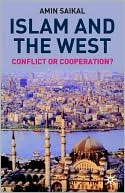

 |

|

The average rating for Islam And The West based on 2 reviews is 4.5 stars.
Review # 1 was written on 2008-12-05 00:00:00 Navinchandra Mehta Navinchandra MehtaAfter briefly reviewing the political and military climate in various Muslim states and in Britain and other European states, as well as US policy toward each of these places, Saikal states, "None of these policy steps, however, could hide the multiplicity of views that concurrently emerged in the West about Islam and Muslims, and the diverse concerns and distrust that intensified in the Muslim world about US motives and objectives after September 11. The views emanating from the USA in particular, and its European and Australian allies in general, were on the whole of three kinds" (14). 1. emphasizing non-religious, non-ethnic, non-racist character of the 'campaign against terror' - rather only against those who abused Islam for selfish reasons - those Bush slipped when he called the war a 'crusade' 2. Western civilization as superior to Islam - that the 'West' guarantees human rights - political and religious, while Islam takes them away. Italian Prime Minister Silvio Berlusconi compared fight against Islam to fight against communism. US Attorney General John Ashcroft reportedly stated, "Islam is a religion in which God requires you to send your son to die. Christianity is a faith in which God sends his son to die for you." 3. Denouncing Islam as a religion that leads to and inspires terrorism. Especially led to condemning Saudi Arabia, with which US had maintained close ties. Criticized those ties and the oil wealth in Saudi Arabia, claiming all Muslim religious schools developed terrorists. Thought US should not remained tied to Saudi Arabia, though it provided source of oil, economic and political stability. Saikal also notes that while it is important to review these policies and note the multiplicity contained within them, there is another important step to understanding the situation: what governments said or did frequently did not characterize how large segments of each state's "populations felt and wanted to react" (16). 1. Points out that extremists staked their claims of authority on representing themselves as having large numbers, though they represented small percentages of the population. 2. Differentiates between the view that the US and its allies did not respect Islam enough and making the leap to extremism. People who were critical of the US were also critical of Al Qaeda, in America, Europe and Muslim states. |
Review # 2 was written on 2008-07-14 00:00:00 Wally Majors Wally MajorsThis book seems to cover what Esposito also argues, but this one avoids the argument and focuses on the facts. It is interesting and allows one to formulate their own opinion. I enjoyed the chapters on Osama Bin Laden. It really points out the shortcomings of the US and their lack of understanding of Islam and the various sects in each country. It's embarrasing to think of some of the foreign policies that the US made, and is making with these countries. |
CAN'T FIND WHAT YOU'RE LOOKING FOR? CLICK HERE!!!